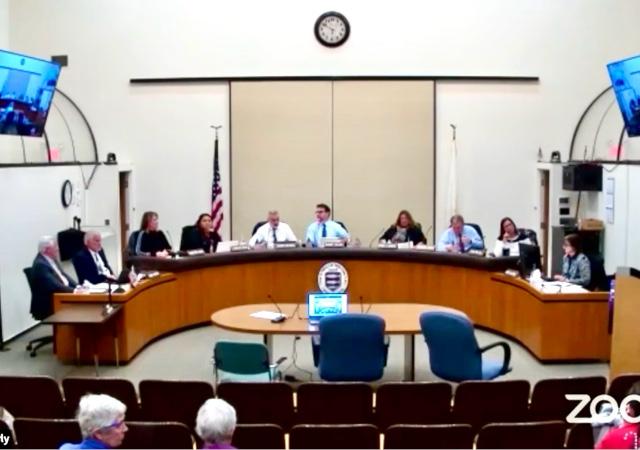Westerly (RI) School Committee Unanimously Rejects State Transgender Guidance Excluding Parents From “Social Transitioning”

On Wednesday, March 20, the Westerly, Rhode Island School Committee voted unanimously to replace the state’s guidance on transgender students with a new policy tailored to the sensibilities of the Westerly community.
The current Westerly protocol the committee voted to replace tracks the Rhode Island Department of Education (RIDE) guidelines that provide for “secret social transitioning.”
We’ve chronicled the controversy over secret social transitioning in public schools here:
- NJ Father Sues State Over Secret Gender Transitioning Policy
- After Male Students Protested To Protect Female Classmates, Pennsylvania High School Nixes Transgender Bathroom Policy
- Groundbreaking Win For Parents: WI State Court Rules Against School’s Secret Gender Transitioning Policy
- Missouri AG Sues School Board Over Secret Transgender Bathroom Policy Meetings
- California Federal Court Says Teachers Don’t Have to Comply With School’s Secret Gender Transitioning Policy
- First Circuit Court of Appeals Hears Oral Argument in School Secret Social Transitioning Case
- California Court Blocks School District’s Gender Notification Policy
- NJ Governor Sues Schools To Halt Parental Notification Of Gender Social Transitioning of Their Kids
- Maryland Parents Can’t Sue School Over Policy On Secret Gender Transitioning, Federal Appeals Court Rules
- Federal Courts Allowing Secret Social Transitioning in Schools, Rebuff Parents’ Rights
Under Westerly’s rules, as elsewhere throughout the country, once a student tells the school they want to become the opposite sex, the school must develop a “gender transition plan.” The school then assigns the student a new name and pronouns, locker, and restroom facilities—all on the student’s say-so.
And, with secondary school students as young as 14, this can happen without the parents’ knowledge or consent:
III. 2. B. Secondary School Students:If school staff believe that a gender identity issue is presenting itself and creating challenges for a student at school, or if the student or parent(s)/ guardian(s) of a student indicates an intention to transition, the school should make every effort to work with the student. Generally, notification to a student’s parent(s)/guardian(s) about their gender identity, expression, or transition is unnecessary, as they are already aware and supportive. However, some transgender students do not want their parents to know about their transgender status. These situations must be addressed on a case-by-case basis and require schools to balance the goal of supporting the student with the desire that parents be kept informed about their children. In these circumstances, school administration should ask the superintendent for direction on how to proceed. If the administration determines that notifying the family carries risks for the student, it should work closely with the student to assess the degree to which, if any, the family will be involved in the process and must consider the age, health, well-being and safety of the student. [emphasis added].
Supporters say these policies are necessary to keep trans kids “safe” and respect their rights. Westerly resident Ann Pierce testified (on behalf of another resident) that there was no need to abolish the current policy that treats trans students “respectfully” and keeps all students “safe and protected.”
But parents are beginning to realize the “safe and supportive school environments” transgender policies are supposed to create may not be so safe after all. Especially when they allow rough tough boys into the girls’ bathroom. Not long ago, a transgender teen entered the girls’ restroom in a Loudon County, Virginia high school to assault a female student there, in a story that made national news.
Girls also have a right to be “safe.”
That was the point Westerly resident and child advocate Bob Chiaradio led with when he testified in support of scrapping the RIDE guidance:
That assault wouldn’t have happened if it hadn’t been for the school’s “safe and inclusive” social transitioning policy. Why not just have trans students use single-occupancy restrooms in each school, Chiaradio suggested.
Dr. Mark Mancini also urged the committee to protect the safety of its students by creating its own policy:
And while there was some discussion about how, exactly, the committee would solicit input from the community, there was no disagreement when the time came to vote. School committee member Lori Wycall’s motion to replace the RIDE guidance passed 7-0.
Wycall was optimistic:
I’m confident that we can do something that’s going to ensure the safety of all students in Westerly, that is going to ensure a safe and supportive learning environment, that will keep the parents involved, that will keep everybody safe and that we can do it without some of the specifics that are in the RIDE guide that I don’t think fit with our community.
Chiaradio says Westerly is the first and only district in the state to commit to replacing RIDE’s guidance with its own locally crafted policy. “With this decision,” he says, “I believe that the dominoes will start to fall across the state.”
CLICK HERE FOR FULL VERSION OF THIS STORY